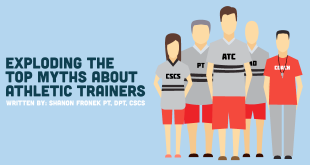Outpatient physical therapy jobs tend to be very different from other physical therapy jobs, especially for new grads. The pace, patient load, and way of thinking are unique, and not everyone immediately thrives in the outpatient environment.
Some folks advise new grads to start in acute and then move to outpatient, while others recommend jumping directly into outpatient right after graduation. Truthfully, anyone can be successful in an outpatient physical therapy job. As a new grad, it may take a bit of extra work, but that’s what you’re here for! Here are some ways that you can be successful in the rewarding outpatient environment.
Ensure your evaluations are fundamentally sound.
If you work in an outpatient physical therapy clinic, you cannot be lazy about your evaluations. You also cannot afford to be disorganized. Ensure that you have a system that works for you, and refine your process until it feels natural. If you never learned a confident evaluation style during school or during your clinicals (it happens!), make sure that you prioritize taking some continuing education classes that focus on the evaluation process. Review your tests and measures so that they’re accurate and you’re not measuring compensatory motions.
As you heard ad nauseum during school, “there is no cookbook approach.” But learn a method that feels right to you, and learn it as soon as you can! The longer you spend feeling flummoxed in the clinic, the worse you’ll feel, and the less likely you’ll stick around in the outpatient setting.
Provide basic exercises at the time of evaluation.
Even if you don’t have all the answers during your evaluation (and you rarely will), you will discover some impairments that you can easily address at the first visit. We all enjoy leaving the dentist with a toothbrush, and your patients enjoy leaving the clinic with a few bits of “medicine.” Prescribe a few corrective exercises, and ensure your patients can perform them correctly. You can always add more later! Less is typically more, anyway; if your patient comes back with increased complaints after their first session with you, it will be hard to tell what caused the complaints if you sent them home with 20 exercises!
Do your homework – outpatient physical therapy jobs require it.
This was the hardest part for me to swallow when I was a new grad. When you’re finally free, with your nights and weekends to spend however you want, it can be tough to sit down and study your patient load after work. But if you want to succeed in outpatient, and actually enjoy yourself, you simply must study and read outside of work, in order to provide the best care to your patients.
This can actually bring some joy into your treatments if you have the right attitude. In an outpatient physical therapy job, the more you learn, the more quickly your patients will improve. The more quickly your patients improve, the happier they, you, your boss, and your coworkers will be. Try to devote 30 minutes per night to studying, and you’ll see a huge difference!
Think like a patient when you are treating.
Remember, your patients’ goals should be your primary focus. It can be easy to lose sight of this fact when you’re working in environments where documentation is challenging or you have an overly monotonous patient load. It can be tempting to get complacent and start treating all of your patients with the same interventions. With certain documentation systems, goals are pre-set. Take that little bit of extra time to discuss what your patients’ goals are, and make sure to keep them at the center of each and every treatment session.
Think like a practice owner the rest of the time.
This is also tremendously important. You were hired to provide value to your clinic, and you will receive commensurate pay raises and promotions based on your performance. If you’re getting all your patients better in record time, awesome! That’s fantastic! But you’ll wind up with gaping holes in your schedule, which isn’t great for business. That means that you need to know how to market yourself and carry your weight, to ensure your schedule stays full. You’ll also need to arrive on time each day and stay up to date with your charting.
Find a good mentor.
Lots of outpatient clinics promise mentorship in order to get you to sign the dotted line for a low new grad salary. Then you walk in the door and there’s nary a mentor in sight. Or, worse, your mentor doesn’t know what he/she is doing, and you learn shoddy treatment habits.
Ask the right questions about mentorship during your interview. Ask what type of mentorship you’ll have, and whether it will be structured. Will time be built into the day for Q&A? How long will you be mentored? Some facilities think 1 month is plenty; at NGPT, we heartily disagree!
Mentor-mentee relationships, when structured correctly, should always be win-win. Mentees get hands-on guidance and real-time feedback to optimize evaluation efficiency and improve treatment skills. The clinic gets a committed top notch clinician engaged in quality patient care. The patient also wins; the combo of new grad enthusiasm and seasoned clinician experience often yields incredible results.
A good outpatient clinic owner recognizes that each therapist develops at his or her own pace. Fox notes that some new therapists are able to build up to seeing 12 patients per day within 6 months, while some take a year to reach that point. He notes, “what’s most important is that the therapist grows professionally without gaps in development. We know there are lots of opportunities for new graduates to make a lot of money seeing a lot of patients, and we always prioritize quality over quantity.”
Develop relationships with your coworkers.
Outpatient physical therapy clinics are like families. You get small ones and large ones, but you see each other a lot, and you really do need to help each other out on a regular basis, especially if you ever want to take a true vacation.
If you’re the schmo who never asks Valerie in the front office how her kids are doing, you’re not going to earn any special treatment from her. Take a genuine interest in your coworkers, their lives, and their interests, and you’ll be treated like a member of the family. If you feel like you’re going in to see your friends and family every day, you’ll enjoy your workplace much, much more.
Join the right clinic.
I cannot stress this enough. If you pick the wrong outpatient physical therapy job, you will simply hate it. You will hate going to work every day, and you will feel exploited, burned out, and frustrated.
You’re probably wondering how to find the right clinic. It really depends on you and what you want. If you’re set on seeing a particular patient load, make sure you ask specifics about your caseload when you’re going through interviews. Don’t forget about mentorship! And be sure to inquire about how long the other therapists been at the company, and what typically causes clinicians to leave.
Another thing to consider is whether you’ll have career growth. Some therapists wish to spend their entire careers as treating clinicians, while others wish to move into management roles or specialization roles. Not every clinic allows this type of growth. Ask if your company promotes from within. If you want to travel and try living in new places, ask what the company policy is for transferring locations after several years.
If you are looking for a great place to kick start your career in outpatient, Motion PT is hiring! Our very own Mark Denesha started his career there, and he quickly went from clinician to clinic director in under a year of practice. Motion PT is looking for long term employees invested in building their practice in a manner consistent with Motion’s core values: integrity, caring, empathy, and innovation. And, Fox adds, “we do this while having fun!”
With 99 clinics located along the east coast from Maryland to Cape Cod, serving diverse clientele with and a rock-solid mentorship program, Motion PT is a great place for newly minted PTs across the US to jump-start their careers. Check out the available jobs at Motion PT Today!
 NewGradPhysicalTherapy.com The Largest Online Resource For New Grad Physical Therapists
NewGradPhysicalTherapy.com The Largest Online Resource For New Grad Physical Therapists







